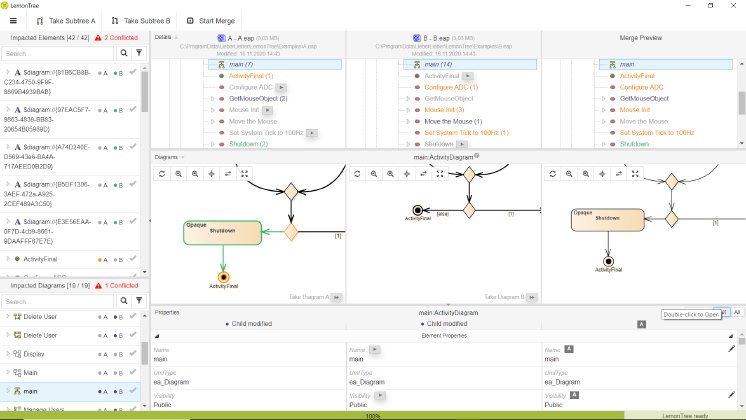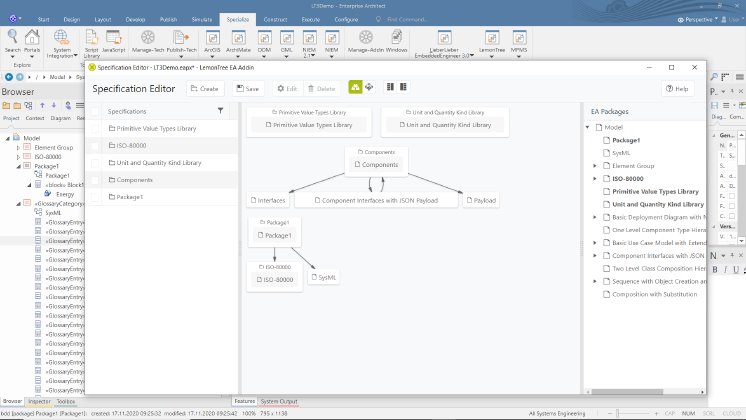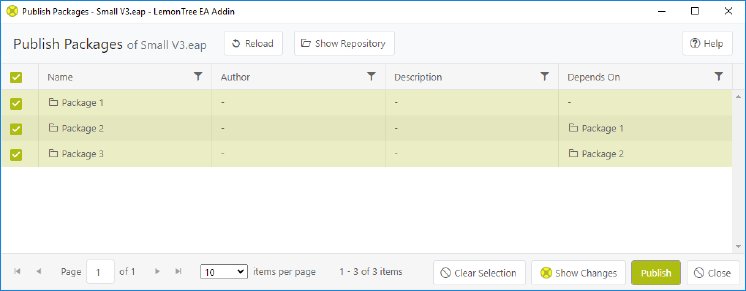In recent years, it has become increasingly clear that model-based software and system development is the best choice for coping with the growing complexity in the product life cycle. It manages to keep both the cost and innovation pressure as well as the growing requirements around safety, traceability and quality under control. Dr. Konrad Wieland, CEO of LieberLieber, comments: "We obviously recognised the development well, because the demand for LemonTree is growing continuously. With version 3.0, we are now taking versioning to a whole new level. Through our permanent contact with the industry, we are sure that we can offer a product that is state of the art in version management and fully meets the practical requirements. We see ourselves as a partner of the industry, which today faces challenges in the area of complexity that have never existed before."
Support for product line development
LieberLieber has developed LemonTree 3.0 specifically for the introduction of model-based product line development with a Model Package Management System (MPMS), based on Enterprise Architect. This allows distributed teams to work on different model versions while keeping the "base software platform" in a consistent state.
The central idea of this concept is the application of already existing approaches that have become established in the configuration management of source code. On the one hand, parts of the model that have been cut out of the platform development can be used as components in the project development without losing the references. On the other hand, it also becomes possible to merge changes in both directions.
Product line development supports companies in reusing or varying software already created within the framework of a platform. The resulting variants differ in their functional scope, but the basic components of the software are always used again.
In this scenario, each user has the security of using or precisely referencing specific artefacts of the model in a defined version. He can import individual versions of a specific package into his model without destroying his previous developments, as LemonTree intelligently merges the parts. This allows a team to reuse individual parts of the development in different projects.
Managing model changes across the entire supply chain
In many sectors, such as the automotive industry, the companies involved in the product development process today often see themselves as elements of networked supply chains that continue to become increasingly complex. Therefore, a product like LemonTree, which is used at a very central point of model-based development, must also meet these requirements. Version 3.0 makes it possible to extract model parts or components from a model and make them available to suppliers for further development. Once external development is complete, the component can be easily reintegrated into the model. Conversely, developers at suppliers or from other internal departments can import predefined model packages into Enterprise Architect for further development. In addition, model parts can be defined as "read-only" so that a supplier can use these parts but not modify them.
Team-based modelling
The central task for LemonTree, which has always been to support team-based collaboration in today's complex projects in the best possible way, has been further expanded with the new release. Thus, a partial model (or the entire model) can still be managed as EAP(x) in versioning systems such as Git, which effectively supports the work of distributed teams. If a component of the model has evolved during parallel editing, it can be easily re-imported thanks to the intelligent merge function. The dependency analysis integrated in LemonTree is used to define model parts more precisely before export. Mutual dependencies can be examined or eliminated if necessary. Simple dependencies and cyclical dependencies between model packages are clearly shown.
Training offerings significantly expanded
Around the presentation of LemonTree 3.0, LieberLieber has also fundamentally revised and expanded its training portfolio. It now covers a broad spectrum, starting with basic training courses via LemonTree seminars to platform and product development with model components. "We develop LemonTree just like our training offers always in close, daily contact with the practice in the industry. In this way, we ensure that we address the current topics, challenges and knowledge needs and reflect them in our product and service offerings. In addition, our customers and interested parties are of course cordially invited to use our help page, which is always updated, or to contact us directly," concludes Wieland.
The new release LemonTree 3.0 is available now. Arrange a webinar today to get to know the solution and its field of application better. We can help your teams optimise collaboration across the entire supply chain in model-based development and thus complete projects faster.
More information about LemonTree:
https://www.lieberlieber.com/lemontree/en/
Find the appropriate training for the optimal use of LemonTree:
https://www.lieberlieber.com/en/team-collaboration-and-versioning-of-models-training/
LemonTree 3.0 - The highlights at a glance
Product line development
- Different life cycles of model components possible
- Reuse of components in different projects
- One platform for all product lines
- Export of model components
- Import prefabricated components into Enterprise Architect
- Import only possible with read permission
- Versioning with Git
- Update of models through intelligent model merging
- Management of dependencies between model components





